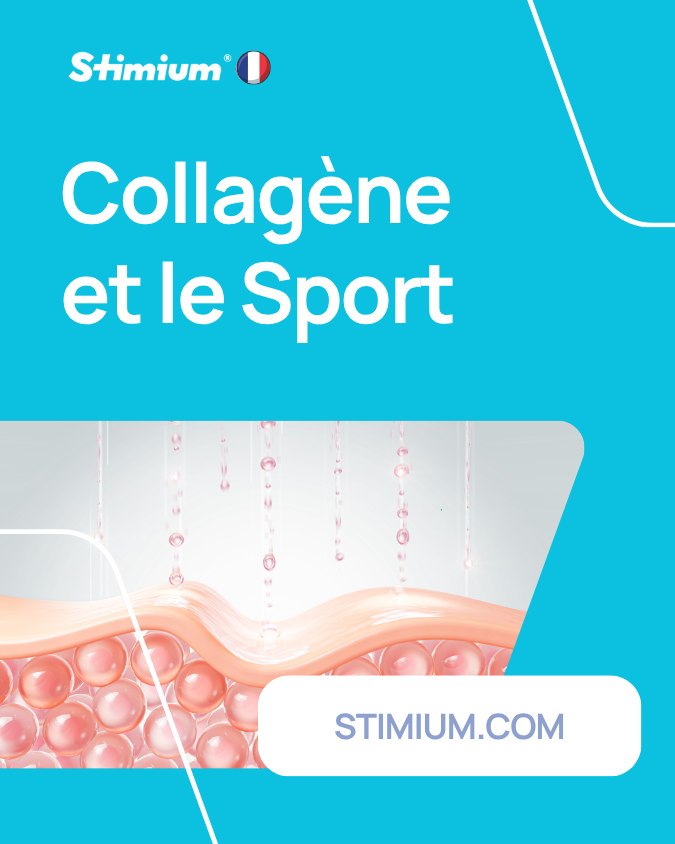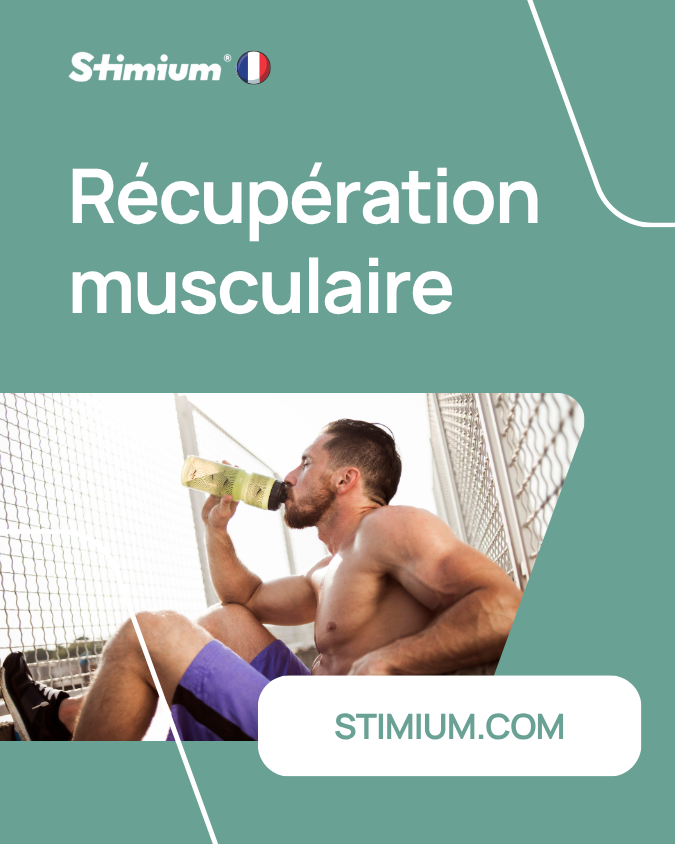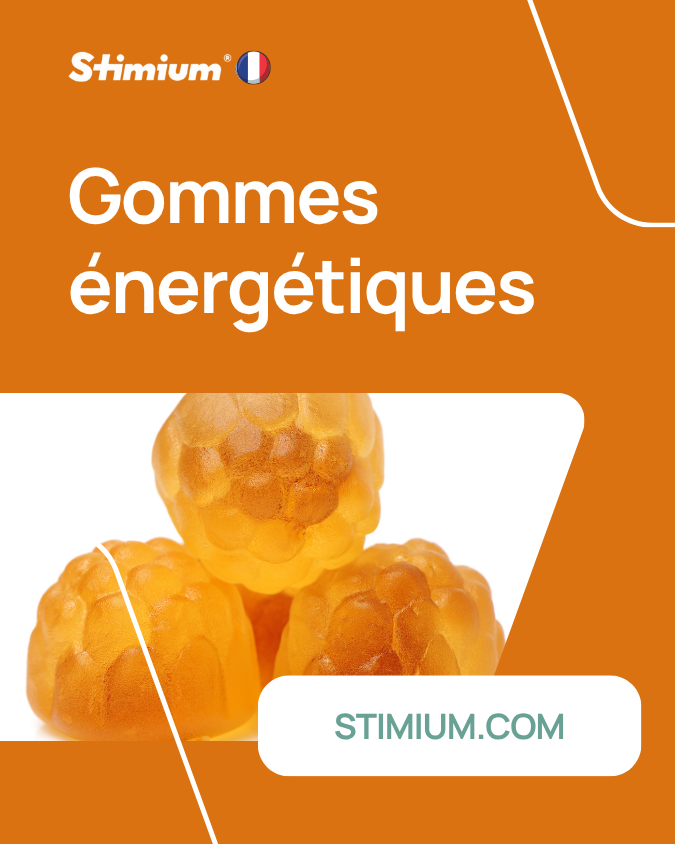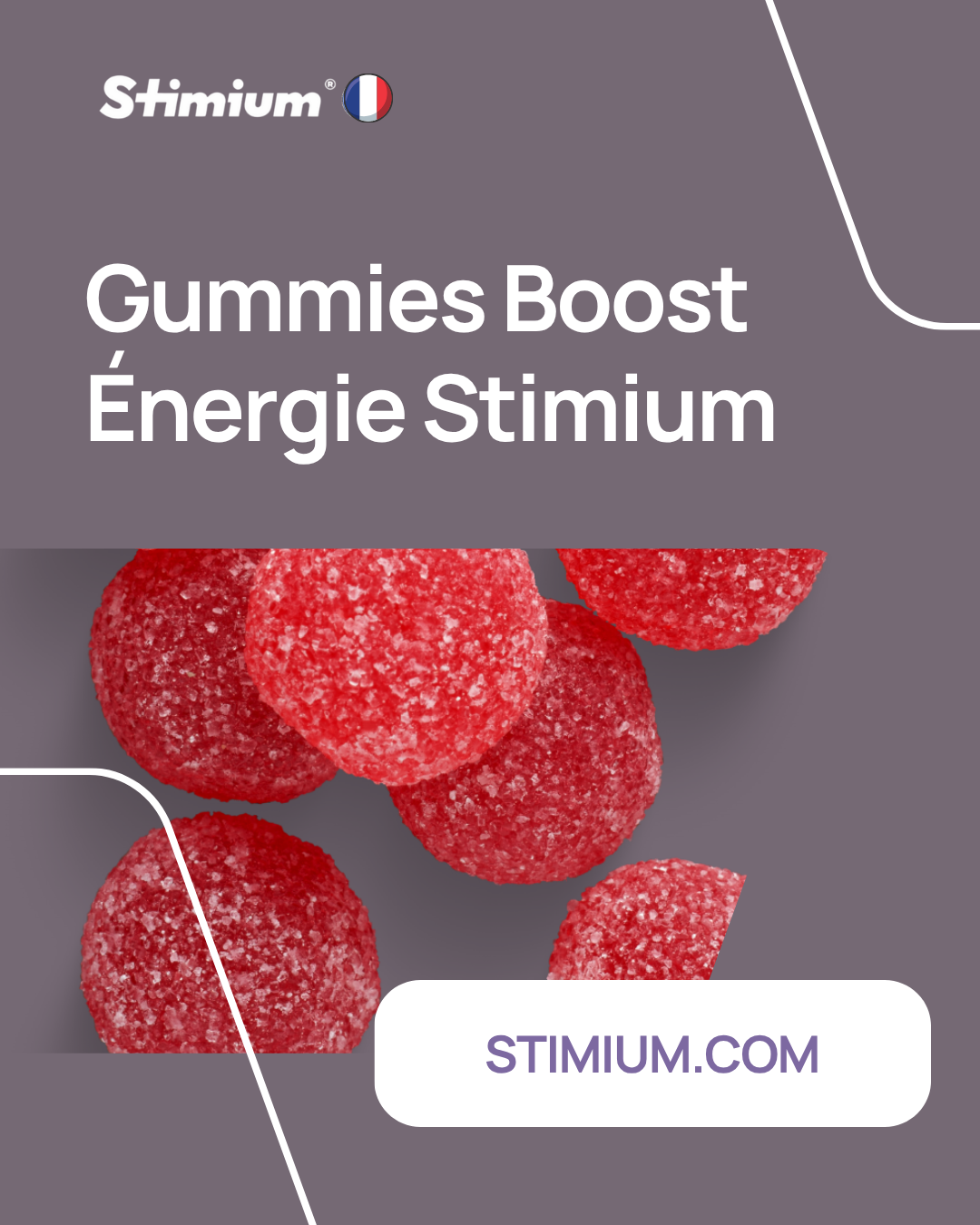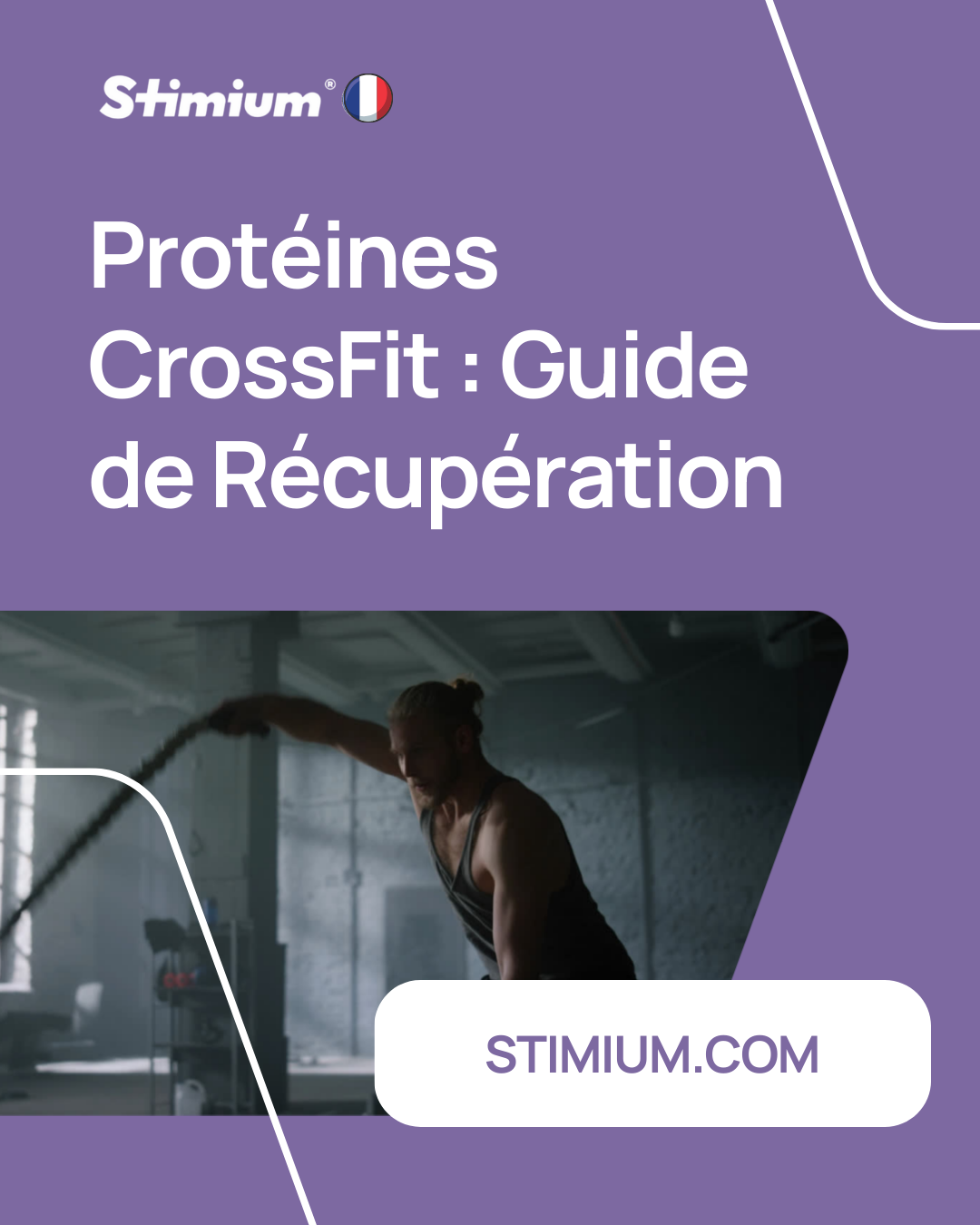Post-workout drinks to optimize recovery
Post-workout drinks help rehydrate the body. They also lower body temperature. Additionally, they provide essential nutrients to tired muscles.
After an intense workout, you lose a lot of water. You can lose up to 6 liters per hour. It is therefore crucial to rehydrate properly.
These drinks contain carbohydrates and electrolytes. Sodium and potassium are among them. They help prevent cramps and maintain good athletic performance.
Choosing the right recovery drink is important. It helps replace water and nutrient losses. This promotes muscle recovery and reduces muscle soreness.
Key Points
- Why recovery drinks are essential after exercise
- Importance of rehydration after exercise
- Muscle regeneration through nutrients
- The Role of Protein Drinks in Muscle Recovery
- Isotonic drinks: rapid and effective rehydration
- Energy drinks for optimal recovery
- Stimium Rgn3 Clean-Up: our solution for recovery
- Stimium MC3 Powder: Boost your recovery
- Hydrating drinks: essential after exercise
- Impact of post-sport drinks on physical performance
- The role of carbohydrates and electrolytes in post-exercise drinks
Why recovery drinks are essential after exercise
Recovery drinks are crucial for athletes after intense exercise. They help rebalance the body's fluids. They also reduce oxidative stress thanks to antioxidants.
Importance of rehydration after exercise
Rehydration is vital after physical exertion. We lose up to 6 liters of water per hour during intense exercise. Extreme weather conditions exacerbate this loss.
It is therefore crucial to drink a suitable recovery drink. It should contain between 500 and 700 mg of sodium per liter. This helps prevent muscle injuries and dehydration.
The pH of the drink should be above 5.5. This prevents excessive acidity and promotes optimal digestion.
Muscle regeneration through nutrients
Recovery drinks should provide essential nutrients. They should contain carbohydrates and proteins. Carbohydrates, often in the form of fructose and glucose, are needed to restore glycogen.
The recommended amount of protein ranges from 10 to 20 grams. This depends on the intensity of the workout. Protein helps rebuild muscle tissue and maintain muscle mass.
Sweat loss can reach 6 liters per hour during intense exercise. Isotonic drinks contain between 40 and 80 grams of carbohydrates per liter. A workout can cause a significant loss of essential minerals.
Protein drinks contribute to muscle recovery and the prevention of muscle soreness. It is recommended to consume a recovery drink 15 to 30 minutes after training.
It is important to consume these nutrients quickly. This optimizes their effectiveness and improves physical performance.
The Role of Protein Drinks in Muscle Recovery
Protein shakes are essential for recovery from physical exertion. They should be consumed within 30 to 45 minutes of exercise. A protein powder shake contains between 10 and 20g of protein, ideal for recovery.
Benefits of Animal and Plant Proteins
Animal proteins, such as whey and casein, are rich in essential amino acids. They are quickly absorbed by the body, aiding in recovery. Plant proteins, such as spirulina and hemp, are a good alternative for those who prefer not to consume animal proteins. They provide fiber and healthy fats, providing balanced nutrition.
Examples of protein drinks
There are many protein drinks on the market, tailored to different needs. Whey-based shakes are very popular for their effectiveness. For those who prefer plant-based sources, shakes made from peas, rice, or blends like spirulina and hemp are available. These options are popular for their digestibility and nutritional benefits.
Regularly drinking protein shakes, whether animal or plant-based, ensures a good intake of essential nutrients. This aids in muscle regeneration and improves overall performance.
Isotonic drinks: rapid and effective rehydration
Isotonic drinks help the body during and after exercise. They contain electrolytes and carbohydrates. This helps rehydrate quickly, especially during long activities like marathons.
How isotonic drinks work
They compensate for water and electrolyte losses caused by sweating. A 2% water loss can decrease athletic performance. A 1% drop in hydration increases heart rate.
For efforts lasting more than one hour, adding electrolytes is recommended.
Isotonic drinks provide between 60 and 90 grams of carbohydrates per liter. They provide the energy needed to continue exercising. Consuming a sip every fifteen minutes helps maintain performance and prevents dehydration.
Energy drinks for optimal recovery
Energy drinks are crucial for muscle recovery after exercise. They help reduce fatigue and strengthen muscles.
Reduced fatigue and prevention of cramps
They contain essential vitamins and minerals. A 60g serving provides 21g of protein and 34g of carbohydrates. These nutrients are vital for recharging energy.
They are also full of BCAAs and glutamine, which accelerate muscle recovery and prevent cramps.
Hydration and electrolyte replenishment
Hydration is essential for muscle recovery. Energy drinks provide the necessary electrolytes. These elements are key to avoiding dehydration and electrolyte imbalances. Adding these drinks to our post-workout routine improves our performance and well-being.
Stimium Rgn3 Clean-Up: our solution for recovery
Stimium Rgn3 Clean-Up is designed to aid recovery after exercise. It contains unique elements that reduce fatigue and protect against oxidative stress. It also helps replenish vitamins and minerals.
Vitamins B2 and B6 are key to reducing muscle fatigue. The product also contains other essential vitamins and minerals. These elements help replenish vitamins and electrolytes, supporting metabolism.
Sodium and potassium are important for fluid and electrolyte balance. Vitamin B12 helps build muscle mass. Vitamin B9 is crucial for cell renewal, especially during endurance sports.
Finally, Stimium Rgn3 Clean-Up contains Amazonian Guarana. This boosts energy and strength without disrupting sleep. This product is safe for sports competitions, compliant with the World Anti-Doping Agency (WADA).
Stimium MC3 Powder: Boost your recovery
Stimium MC3 Powder can transform your post-workout recovery process. This supplement is a true ally for athletes, designed to optimize their performance and recovery.
Composition and benefits
Stimium MC3 Powder is composed of Citrulline Malate, L-Citrulline, and Maltodextrin, key ingredients with multiple benefits:
- Citrulline Malate: Promotes nitric oxide production, improving blood flow and nutrient delivery to muscles.
- L-Citrulline: Also stimulates nitric oxide, promoting better oxygen transport to muscle tissue.
The main benefits of Stimium MC3 Powder include:
- This product helps athletes maintain optimal condition, even after intensive training.
Instructions for use and dosage
Stimium MC3 Powder is ideally consumed post-workout to maximize its recovery effects. Each container contains easy-to-measure doses.
Each serving provides:
- 2.7 g of Citrulline Malate.
- 187 mg of magnesium, an essential mineral for reducing fatigue and supporting muscle function.
The powder is simple to prepare, easily assimilated and has no known side effects.
In summary
Stimium MC3 Powder is an essential supplement for athletes seeking optimal performance and rapid recovery. Compliant with World Anti-Doping Agency regulations, it guarantees safe and effective use to support your athletic goals.
Hydrating drinks: essential after exercise
After intense exercise, we lose up to 6 liters of water per hour. This highlights the importance of drinking hydrating drinks to recover. Drinking enough water is essential for maintaining athletic performance and health.
Fight against dehydration
We feel thirsty when we're already a little dehydrated. This can reduce our performance by 10%. Therefore, it's important to drink little by little, 200 to 300 ml beforehand and 1 to 2 mouthfuls every 5 to 10 minutes during exercise.
Hydration drinks, with their electrolytes, are more effective than water for rehydrating quickly.
Maltodextrin: Provides a quick source of carbohydrates to replenish muscle energy stores.
- Accelerated muscle recovery.
- A reduction in cramps and post-exercise pain.
- An overall improvement in physical performance.
Prevention of muscle aches
Hydrating drinks also help prevent muscle soreness. Lactic acid, which builds up during exercise, causes muscle soreness afterward. Drinking enough water helps eliminate these toxins and promote faster recovery.
Fruit juices like cherry juice or coconut water, rich in antioxidants and potassium, are very helpful. Drinking hydrating drinks after exercise helps keep muscles healthy and recover faster.
Impact of post-sport drinks on physical performance
Post-workout drinks have a significant impact on our performance. They help rehydrate athletes and replace water loss. During intense exercise, we can lose up to 6 liters of water per hour.
Isotonic drinks are essential for replenishing carbohydrates and maintaining electrolyte balance. They should contain between 40 and 80 grams of carbohydrates per liter. It is recommended to drink 150 to 250 mL every 10-20 minutes during exercise.
Improper rehydration can cause weight loss of more than 2%. This can lead to fatigue and muscle cramps. Post-workout protein shakes help rebuild protein and improve muscle recovery.
Understanding the impact of post-workout drinks is essential to improving our performance. By choosing the right post-workout drinks, we can better recover and perform.
The role of carbohydrates and electrolytes in post-exercise drinks
After intense physical activity, it is crucial to rehydrate and replenish energy. Athletes should consume carbohydrates, proteins, and minerals within 30 minutes of exercise. Carbohydrates play an essential role in recharging muscles.
Electrolytes are extremely important. The key minerals to replace are sodium chloride, potassium, calcium, and magnesium. Salt is the most lost during exercise, so replenishing it is crucial.
A good carbohydrate to protein ratio for endurance athletes is 4:1.
Poor recovery can cause many problems. It can weaken the immune system and increase the risk of illness and injury. Proper recovery helps prevent fatigue and muscle soreness.
In conclusion, carbohydrate- and electrolyte-rich drinks are essential. They help replenish post-exercise losses and ensure efficient muscle recovery. This helps maintain long-term performance.
Conclusion
Optimizing post-workout recovery is essential to improving our performance. Choosing the right post-workout drinks is crucial. They should be rich in carbohydrates, protein, and electrolytes.
This helps rehydrate, reduce muscle soreness, and regenerate muscles. It's important to remember that dehydration affects our performance and well-being. A weight loss of more than 2% can cause fatigue and cramps.
Consuming appropriate drinks, especially isotonic ones with sodium, helps avoid these problems. This improves our ability to perform longer workouts.
Considering natural and healthy beverage alternatives is a good idea. Alcohol, however, should be avoided during recovery. It disrupts muscle protein synthesis and affects sleep.
